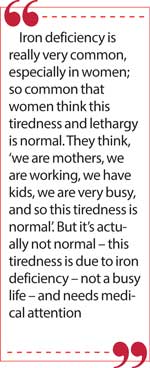Friday Feb 27, 2026
Friday Feb 27, 2026
Wednesday, 28 August 2024 00:08 - - {{hitsCtrl.values.hits}}

Parkway Hospitals Singapore Senior Consultant Haematologist Dr. Dawn Mya Hae Tha

Iron deficiency is easy to treat, yet many people suffer from it as the recognition of this condition is low
By Fathima Riznaz Hafi
Parkway Hospitals Singapore Senior Consultant Haematologist Dr. Dawn Mya Hae Tha at a recent press meet in Colombo noted that many blood conditions, particularly iron deficiency (anaemia), still lack awareness. She said iron deficiency is easy to treat, yet many people suffer from it as the recognition of this condition is low. It is the lack of attention to iron deficiency and subsequent negligence in seeking treatment that lead to health complications – not the lack of treatment available.
Dr. Mya specialises in haematology – treating blood disorders and diseases, which include benign (non cancerous) blood conditions such as thalassemia, sickle cell anaemia, bleeding problems, and anaemia, as well as blood cancers such as leukaemia, lymphoma, and multiple myeloma.
Benign blood conditions
“In blood specialty, there are mainly two arms – one is benign conditions and the other is blood cancers. The common conditions that the public is aware of are probably blood cancers (leukaemia, lymphoma, multiple myeloma). But there are many other blood conditions, of which the awareness is still low, like anaemia. Women are most prone to it because of the blood loss during menstruation, and our Asian diets (we don’t eat a lot of red meat),” Dr. Mya said.
Patients with anaemia experience tiredness, lethargy, headaches, and dizziness, among other symptoms. Many women experience these symptoms but are not aware that they are due to a medical condition. “Iron deficiency is really very common; so common that women think this tiredness and lethargy is normal. They think, ‘we are mothers, we are working, we have kids, we are very busy, and so this tiredness is normal’. But it’s actually not normal – this tiredness is due to iron deficiency – not a busy life – and needs medical attention,” she said.
It can be treated simply by replacing iron, but the recognition of that kind of condition is important, so the patient would know what is happening and who to go to. “Usually the blood specialist will take care of it; when we see a patient, and find abnormalities, we will diagnose what the patient has – confirming whether it’s a benign condition or cancerous.” The necessary treatment then begins according to the diagnosis.
Congenital conditions
 Asked if a benign blood condition also requires long-term treatment, Dr. Mya said it depends on the condition and the source of the problem. If it is iron deficiency, and we know the cause and correct that then it is treated. For example, if the person has bleeding haemorrhoids (piles), and the iron deficiency is due to the bleeding haemorrhoids, and the haemorrhoid is surgically removed, the bleeding then stops and there won’t be iron deficiency anymore. So that is cured and completed. But there are some congenital conditions (inherited), like thalassemia, which is something one is born with and if it is major, which is associated with significant anaemia, then that is lifelong and you need to rely on medication and recurrent blood transfusion.
Asked if a benign blood condition also requires long-term treatment, Dr. Mya said it depends on the condition and the source of the problem. If it is iron deficiency, and we know the cause and correct that then it is treated. For example, if the person has bleeding haemorrhoids (piles), and the iron deficiency is due to the bleeding haemorrhoids, and the haemorrhoid is surgically removed, the bleeding then stops and there won’t be iron deficiency anymore. So that is cured and completed. But there are some congenital conditions (inherited), like thalassemia, which is something one is born with and if it is major, which is associated with significant anaemia, then that is lifelong and you need to rely on medication and recurrent blood transfusion.
“Benign conditions are mostly not fatal but there can be severe conditions; like with thalassemia, if you don’t manage it properly, if the patient does not get blood transfusion as necessary, or, yes, the patient gets blood transfusion repeatedly but along with the blood transfusion if the patient gets complications like blood-related infections such as HIV or Hepatitis C (the viruses that can be transmitted through the blood) or iron overload (with repeated blood transfusion you get a lot of iron into the body and you can’t remove it unless you take the medicine to remove it); and if the doctor doesn’t manage them well, that can lead to organ failures – a lot of iron can go into the heart, or liver, and that can lead to organ failure and they can eventually die from that. So, it’s not immediately fatal but if it is not managed well, things can go wrong,” she warned.
The danger there, is from repeated transfusion, but the doctor says the patients need that transfusion to live, so they have to do the transfusion but at the same time, to prevent the iron overload, they need to take some medicine to remove the iron. That part – the management – sometimes can be sub-optimal and that can lead to complications, she added.
Find the cause
The doctor was asked, if a person who has anaemia, takes iron supplements and brings the numbers up to a normal level, will there be a relapse after she is taken off the meds, or is that a permanent solution. She replied, “For iron deficiency, if you give iron, it is like when a bag has a hole and whatever in the bag is leaking and you are just topping up what is in the bag. But you should get rid of this hole which is causing the leak. It’s the same for iron deficiency. You need to find out first, why they are iron deficient. Taking iron is just topping up; you need to find out why this patient has iron deficiency. And you need to get rid of the cause and then after you replace it to the normal range, you can stop.”
But if you cannot get rid of this cause of iron deficiency, once you stop it, your level will go down again, she said. “The best example is women with heavy periods. Heavy periods is something you can’t get rid of unless you see your gynaecologist, and agree with some hormonal therapy, like putting the device or hormonal injections and you stop the menses. But if you don’t want to do anything about it, because after all, this is part of normal life, then you have to continue to take iron supplements, and once you stop it and your period is still very heavy, after a while you will get iron deficient again. So it really depends.
“Also, to most of my patients, after achieving the normal level, I would tell them, during their periods or one week after, for about two weeks or so, every month to take some iron supplements.”
It was brought up that there are women who don’t have heavy bleeding issues but are anaemic. Dr. Mya was asked why this was do. She explained, “That’s accumulated. Since their younger age they have bled and their iron store is so low and along the way they got pregnant, and then there’s childbirth, and then nursing the child; so all these lead to iron deficiency – over a long time.”
When asked if along with the iron supplements, food can also help, Dr. Mya replied, “Yes, but with the Asian diet it’s hard as you have to take red meat; and it’s a problem for vegetarians as well. The main thing is the cause of this iron deficiency; this persistent bleeding is very hard to replace. Sometimes even oral iron doesn’t work because of the heavy bleeding.”
“So now you know and start taking oral iron, but the absorption of the iron that you take has a limit. Even if let’s say you want to take a lot because you want to get a lot of iron at one go, your intestines will not absorb it. So there’s a limit. In that kind of patient, usually I just give IV (intravenous) as the absorption will bypass the intestines – there’s no limit. The dose that you want to go in, will go in straight, therefore, there will be improvement in a very short period. And afterwards you can maintain with oral meds,” she added.
Asked if iron deficiency can eventually lead to cancer, the doctor said, “No; they are separate blood diseases, separate entities.”
Blood cancers and advancement in treatment
After sharing some much-needed awareness on benign blood conditions, Dr. Mya moved on to talk about blood cancers. “Some blood cancers are very aggressive but fortunately the incidence of blood cancers is very low. Blood cancer is not among the top 3 cancers – it makes up about 3-7% of the new cancers diagnosed per year,” she said.
Dr. Mya noted that the survival rate from blood cancers has been improving tremendously and she attributes this improvement to advancements in treatment compared to 10-30 years ago.
“The survival rates from blood cancers have gone up; that is a result of medical advances. A lot of new drugs, new types of treatment are available, and with that, patients have a higher chance of recovery. Along with these drugs that can treat cancer, supportive care has also improved. Supportive care means the hospitals, facilities, and the training of the doctors, nurses, and the whole team that is taking care of the patients – the whole quality of the team has improved. Also, along with the blood cancer treatment, complications can take place, like bleeding or infections, so we need to manage those complications as well, and this management has also improved.”
However, she added, that doesn’t mean people don’t die from blood cancers anymore as blood cancers are very aggressive. So even with the new advances, we still cannot guarantee 100% cure – it really depends on what type we are dealing with. Even for leukaemia, there are different sub-types; for some leukaemia a good outcome can be achieved very easily. But in some it can be very tough.
“After we diagnose a patient with blood cancer, we see what sub-type the patient is having; what type of leukaemia it is. There are a lot of advanced tests available, which are mainly genetic mutation tests (gene mutation tests) and from these gene mutation tests we will see what kind of mutations this blood cancer has,” she explained. “Some mutations are very bad – there is no specific drug available yet, whereas some mutations are very easy to treat – there’s target therapy available; therefore the cure rate is very high.”